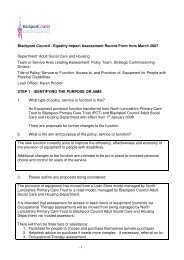Mental capacity policy [PDF 126KB] - Blackpool Borough Council
Mental capacity policy [PDF 126KB] - Blackpool Borough Council
Mental capacity policy [PDF 126KB] - Blackpool Borough Council
You also want an ePaper? Increase the reach of your titles
YUMPU automatically turns print PDFs into web optimized ePapers that Google loves.
BLACKPOOL COUNCIL - HOUSING AND SOCIAL SERVICES<br />
Housing and Social Services<br />
Equality Impact Assessment of<br />
Policy On <strong>Mental</strong> Capacity<br />
<strong>Blackpool</strong> will be a Vibrant, Inclusive,<br />
Healthy, Safe and Prosperous Town
Document Information<br />
Issue Date 18.04.07<br />
Version/Issue Number<br />
Document Status<br />
a<br />
Final<br />
Effective From Date 18.04.07<br />
Document Sponsor<br />
Author<br />
Name<br />
Job Title<br />
Division<br />
Name<br />
Job Title<br />
Team<br />
David Clear<br />
Assistant Director <strong>Mental</strong> Health &<br />
Learning Disability<br />
Housing and Social Service<br />
Michael Watson<br />
Policy Officer<br />
Contact Tel: 651957<br />
Policy and Service Development<br />
Amendment Record<br />
Date Issue No. Section/Page Details of Change Authorised By:<br />
Amendment Notes<br />
• Documents at draft status are to use letter designations to denote issue status: a, b, c, etc.<br />
• Documents at full issue status are to use number designations to denote issue status: 01,02,03,<br />
etc.<br />
• On full issue the draft amendment record should be deleted from the above table.<br />
• Notification of the amendment must be sent to the person maintaining the Central Register.
EQUALITY IMPACT ASSESSMENT<br />
Name of the service, <strong>policy</strong> or function being assessed<br />
Directorate<br />
Is this a <strong>policy</strong> or a function<br />
Is this a new or existing <strong>policy</strong> or function<br />
Policy On <strong>Mental</strong> Capacity<br />
Social Services<br />
Policy Function<br />
Policy New Function<br />
Names and roles of the people carrying out the Impact Assessment<br />
(Explain why the members of the impact assessment team were selected ie the knowledge and experience they<br />
bring to the process. Also identify lead contact.)<br />
Name<br />
Role, Knowledge & Experience<br />
1 Michael Watson<br />
Policy Officer, Policy Lead on Implementation of <strong>Mental</strong> Capacity<br />
Act 2005<br />
Service Head<br />
David Clear<br />
Signature<br />
Date 18.04.2007<br />
Once you have filled in this document please send a copy to the Faith Equality and Diversity Team
SECTION 1<br />
AIMS & IMPLEMENTATION OF THE POLICY<br />
Identifying the aims of the <strong>policy</strong><br />
What is the <strong>policy</strong>?<br />
What is the aim, objective or purpose of the <strong>policy</strong>?<br />
The aim of the <strong>policy</strong> is to ensure that the provisions and key principles of the <strong>Mental</strong> Capacity Act 2005 are<br />
adhered to.<br />
Rationale behind the <strong>policy</strong> and its delivery<br />
Please state the underlying <strong>policy</strong> objectives that underpin this service and what they are trying to achieve.<br />
Are there associated objectives of the <strong>policy</strong>? If so what are they?<br />
What outcomes do we want to achieve from this <strong>policy</strong>?<br />
What factors contribute/detract from the outcomes?<br />
The <strong>Mental</strong> Capacity Act is based on a number of fundamental principles and it is vital that these principles are<br />
incorporated into both the formal operation of the department i.e. policies and procedures as well as the way that<br />
managers and staff operate on a day to day basis.<br />
Every adult has the right to make his/her own decisions and must be assumed to have <strong>capacity</strong> to do so unless it<br />
is proved otherwise<br />
People must be given all appropriate help before anyone concludes that they cannot make their own decisions<br />
Individuals must retain the right to make what might be seen as eccentric or unwise decisions<br />
Anything done for or on behalf of people without <strong>capacity</strong> must be in their best interests<br />
Anything done for or on behalf of people without <strong>capacity</strong> should be the least restrictive of their basic rights and<br />
freedoms<br />
Who is affected by the <strong>policy</strong>? Who is intended to benefit from it an how?<br />
Who are the main stakeholders in relation to the <strong>policy</strong>?<br />
What outcomes would other stakeholders want from this <strong>policy</strong>?<br />
Are there any groups which might be expected to benefit from the intended outcomes but which do not?<br />
The <strong>policy</strong> applies to all staff of <strong>Blackpool</strong> Social Services and all staff of agencies contracted by <strong>Blackpool</strong> Social<br />
Services in dealing with all Service Users, except those detained under the <strong>Mental</strong> Health Act 1983<br />
All Service Users<br />
People working in a professional <strong>capacity</strong> e.g. a social worker<br />
People who are receiving payment for work in acting in relation to the person without <strong>capacity</strong> (for example, a<br />
care assistant working in a residential care home)<br />
People who are paid to work with people without <strong>capacity</strong><br />
Volunteers acting in relation to the person without <strong>capacity</strong> (for example, a volunteer sitter working in a service<br />
user’s home)<br />
Anyone who is an attorney under the Lasting Power of Attorney.<br />
Anyone who is a deputy appointed by the Court of Protection<br />
Anyone acting as an Independent <strong>Mental</strong> Capacity Advocate<br />
Anyone carrying out research approved in accordance with the <strong>Mental</strong> Capacity Act
Promotion of good relations between different communities<br />
(How does the <strong>policy</strong> or function contribute to better Community Cohesion?)<br />
How do you promote good relations between different communities you serve based on mutual understanding<br />
and respect?<br />
What opportunities are there for positive cross-cultural contact between these communities to take place e.g.<br />
between younger and older people, or between people of different religious faiths?<br />
The <strong>policy</strong> is not intended to directly promote good relations between different communities.<br />
(Specifically identify the relevance of the aims of the <strong>policy</strong> to the equality target groups and the<br />
<strong>Council</strong>’s duty to eliminate unlawful racial discrimination, promote equality of opportunity and good<br />
relations between people of different racial groups).<br />
No specific relevance to individual equality groups. The <strong>policy</strong> applies to all Service Users.<br />
Policy Priorities:<br />
How does the <strong>policy</strong> relate to other policies and practices within the council?<br />
What factors/forces could contribute/detract from the outcomes?<br />
How do these outcomes meet or hinder other policies, values or objectives of the council?<br />
The Policy is in keeping with the provisions of the <strong>Mental</strong> Capacity Act 2005 and informs the way duties and<br />
practices under current social care law are discharged.<br />
How is the <strong>policy</strong> implemented<br />
(How is, or will, the <strong>policy</strong> be put into practice and who is, or will be, responsible for it?)<br />
Who defines or defined the <strong>policy</strong>?<br />
Who implements the <strong>policy</strong>?<br />
How does the council interface with other bodies in relation to the implementation of this <strong>policy</strong>?<br />
Is the service provided solely by the Department or in conjunction with another department, agency or<br />
contractor?<br />
If external parties are involved then what are the measures in place to ensure that they comply with the <strong>Council</strong>’s<br />
Equal Opportunities <strong>policy</strong>?<br />
The content of the Policy is largely determined by the <strong>Mental</strong> Capacity Act 2005. The Policy will be applied by all<br />
staff working with all Service Users who may, or who have been assessed as lacking <strong>capacity</strong>. The <strong>Mental</strong><br />
Capacity Act will also apply to partner agencies, in particular the NHS and care providers who will have to develop<br />
and implement their own <strong>policy</strong>. A Department of Health funded training programme is in place to ensure the<br />
Policy is applied consistently within Social Services.
SECTION 2<br />
CONSIDERATION OF DATA & RESEARCH<br />
List all examples of quantitative and qualitative data available that will enable the impact assessment to<br />
be undertaken<br />
Include information where appropriate from other directorates, Census 2001 etc.<br />
<strong>Blackpool</strong> Figures, Office of National Statistics (Census Information), National Statistics reports (Department of<br />
Work and Pensions)<br />
Population<br />
<strong>Blackpool</strong> has a total population of 142,283, 48% men and 52% women (similar to national gender balance).<br />
Marital Status<br />
In total 42% of <strong>Blackpool</strong>’s adult population is single, 29% is within their first marriage, and a further 29% is<br />
remarried, separated, divorced or widowed. In contrast the North West figures are 45%, 34% and 21%, and<br />
England’s figures are 44%, 35% and 21%<br />
Children/Caring Responsibilities<br />
The percentage of households with dependent children is lower in <strong>Blackpool</strong> (26.1%) than regionally (30.5%) and<br />
nationally (29.5%).<br />
Ethnicity/Religion<br />
<strong>Blackpool</strong> has a very low number/percentage of people from BME communities with 98.4% classifying<br />
themselves as white. The percentages are lower in the North West (94.4%) and in England (90.9%).<br />
Sexuality % f % %<br />
The percentage of people indicating they live in a same sex relationship is higher in <strong>Blackpool</strong> at 0.5% than in the<br />
North West or England (0.2%).<br />
Age<br />
<strong>Blackpool</strong> has an older population than in the North West and in England as a whole<br />
- 20% of the population is over 65 in <strong>Blackpool</strong>, as oppose to 16% in England and North West.- 16% of the<br />
population in <strong>Blackpool</strong> aged 16-74 are classed as economically inactive/retired, as oppose to 14% regionally and<br />
nationally.<br />
- There are more retired women than men.<br />
Health<br />
<strong>Blackpool</strong> has more people in poorer health than regionally and countrywide<br />
- 14% of <strong>Blackpool</strong> population indicate they are not in good health, this is higher than in North West (11%) and<br />
within England (9%)<br />
- 25% believe they have a limiting long term illness in <strong>Blackpool</strong>, this is higher than in North West (21%) and<br />
within England (18%).<br />
- 10% of people between 16-74 are permanently sick or disabled and economically inactive. Percentages are 8%<br />
for the NW and 5 for England. In <strong>Blackpool</strong> approximately a third more men than women are in this category.<br />
- 42.9% of households in <strong>Blackpool</strong> include one or more person with a limiting long-term illness, statistics in the<br />
North West are 38.4% and in England 33.6%.<br />
In<strong>capacity</strong> Benefit/Severe Disablement Allowance (from Feb 2006 figures)<br />
In <strong>Blackpool</strong> 10,530 people receive in<strong>capacity</strong> benefit and 990 people receive or severe disablement allowance<br />
making a total of 11,520. This is a higher proportion of the population than regionally or nationally.<br />
There has been a reduction in the number of people claiming In<strong>capacity</strong> Benefit, between Feb 2005 and Feb<br />
2006 (by -2.6%), which appears to follow a national downward trend. However between Aug 2001 and Feb 2006<br />
there has been an increase of +2.6% in <strong>Blackpool</strong> IB claims, which is in line with the national increase of +2.7%,<br />
but not with the regional reduction of -4.1% over the same period.<br />
There has been a sharper reduction in the numbers claiming Severe Disablement Allowance. Between August<br />
2001 and February 2006 there has been a -19.5% reduction in the number of claimants for SDA in <strong>Blackpool</strong>, and<br />
a steeper decline of -22.7% and -23.5 regionally and nationally over the same period.<br />
5% of claimants are under 25, 49% between 25 and 49, 33% between 55-59 and 13% over 60.<br />
62% of people claiming these benefits are male (58% in NW, England)<br />
76% of people have been claiming for more than 2 years<br />
The majority of people claiming these benefits are for are mental disorders (41%), followed by musculoskeletal<br />
injuries/conditions(18%).
Equalities profile of users or beneficiaries<br />
(Use the <strong>Council</strong>’s approved diversity monitoring categories and provide data by target group of users or<br />
beneficiaries to determine whether the service user profile reflects the local population or relevant target group or<br />
if there is over or under representation of these groups)<br />
The Social Services Service User profile does not currently match the community profile.<br />
Equalities profile of staff<br />
(Indicate profile by target groups and assess relevance to <strong>policy</strong> aims and objectives e.g. Workforce to Reflect<br />
the Community. Identify staff responsible for delivering the service including where they are not directly<br />
employed by the council)<br />
The Social Services staff profile does not match the community profile but does match the Service User profile.<br />
Evidence of complaints against the service on the grounds of discrimination<br />
(Is there any evidence of complaints either from customers or staff (Grievance) as to the delivery of the service,<br />
or its operation, on the equality target groups?)<br />
No evidence of complaints available as the legislation behind the <strong>policy</strong> is new.<br />
Barriers<br />
(What are the potential or known barriers to participation for the different equality target groups?)<br />
There are no known barriers to participation for the equality target groups.
Recent consultation exercises carried out<br />
(Detail consultation with relevant interest groups, other public bodies, voluntary organisations, community groups,<br />
trade unions, focus groups and other groups, surveys and questionnaires undertaken etc. Focus in particular on<br />
the findings of views expressed by the equality target groups)<br />
The <strong>Mental</strong> Capacity Act 2005 underwent extensive consultation before it's passage through parliament. The<br />
Code of Conduct derived from the legislation by the Department of Health has also been through rigorous<br />
consultation with stakeholders and the public before being agreed and published. Social Work management and<br />
staff groups were consulted in the development of this Policy and contributed to the assessment of the impact of<br />
the Policy.<br />
Identify areas where more information may be needed and the action taken to obtain this data.<br />
(You will need to consider data that is monitored but not reported, data that could be monitored but is not currently<br />
Gaps in information:<br />
The Department does not routinely collect information about Service User sexuality unless of importance to the<br />
provision of services.<br />
Action needed:<br />
(Include short-term measures to be taken to provide a baseline where no or little information is available)<br />
There are no plans to routinely collect information about sexuality.
SECTION 3<br />
ASSESSMENT OF IMPACT<br />
Race - Testing of disproportionate or adverse impact<br />
Identify the effect of the <strong>policy</strong> on different race groups from information available above.<br />
There is no direct link between lacking <strong>capacity</strong> to make decisions or potentially lacking <strong>capacity</strong> to make<br />
decisions and individual race groups.<br />
How is the race target group reflected in the take up of the service?<br />
The current Social Services Service User profile does not match the community profile as there are social<br />
characteristics of some race groups that mean that they are less likely to access services.<br />
From the evidence above does the <strong>policy</strong> affect, or have the potential to affect, racial groups differently<br />
and if so do any of the differences amount to adverse impact or unlawful discrimination?<br />
There will be no direct or indirect impact on different race groups.<br />
If there is an adverse impact, can it be justified on the grounds of promoting equality of opportunity for<br />
one racial group or for another legitimate reason?<br />
No adverse impact.<br />
Could the <strong>policy</strong> discriminate, directly or indirectly and if so is it justifiable under legislation?<br />
There is no evidence that the Policy will discriminate directly or indirectly.<br />
Gender - Testing of disproportionate or adverse impact<br />
Identify the effect of the <strong>policy</strong> on gender groups from information available above.<br />
There is no direct link between lacking <strong>capacity</strong> to make decisions, or potentially lacking <strong>capacity</strong> to make<br />
decisions, and gender.<br />
How is the gender target group reflected in the take up of the service?<br />
The Service User profile is broadly similar to the community profile but is slightly skewed towards women as<br />
women tend to live longer.<br />
From the evidence above does the <strong>policy</strong> affect, or have the potential to affect, gender groups differently<br />
and if so do any of the differences amount to adverse impact or unlawful discrimination?<br />
There will be no direct or indirect impact on different equality groups although the Policy is likely to beneficially<br />
affect more women than men.<br />
If there is an adverse impact, can it be justified on the grounds of promoting equality of opportunity for<br />
one gender group or for another legitimate reason?<br />
No adverse impact.<br />
Could the <strong>policy</strong> discriminate, directly or indirectly and if so is it justifiable under legislation?<br />
There is no evidence that the Policy will discriminate directly or indirectly. It is the intention of the Policy to ensure<br />
fairer treatment for people who lack <strong>capacity</strong> or who may lack <strong>capacity</strong>.
Disability - Testing of disproportionate or adverse impact<br />
Identify the effect of the <strong>policy</strong> on the disability target group from information available above.<br />
There is no direct link between lacking <strong>capacity</strong> to make decisions, or potentially lacking <strong>capacity</strong> to make<br />
decisions, and disability.<br />
How are disabled people reflected in the take up of the service?<br />
The profile of Service Users is broadly similar to the community profile.<br />
From the evidence above does the <strong>policy</strong> affect, or have the potential to affect, disability groups<br />
differently and if so do any of the differences amount to adverse impact or unlawful discrimination?<br />
There will be no direct or indirect impact on disability groups. People with an acquired brain injury and people with<br />
a learning disability may benefit from the Policy.<br />
If there is an adverse impact, can it be justified on the grounds of promoting equality of opportunity for<br />
one disability group or for another legitimate reason?<br />
No adverse impact.<br />
Could the <strong>policy</strong> discriminate, directly or indirectly and if so is it justifiable under legislation?<br />
There is no evidence that the Policy will discriminate directly or indirectly. It is the intention of the Policy to ensure<br />
fairer treatment for people who lack <strong>capacity</strong> or who may lack <strong>capacity</strong>.<br />
Age - Testing of disproportionate or adverse impact<br />
Identify the effect of the <strong>policy</strong> on different age groups from information available above.<br />
There is no direct link between lacking <strong>capacity</strong> to make decisions or potentially lacking <strong>capacity</strong> to make<br />
decisions and different age groups. However, older people may be more likely to lack <strong>capacity</strong> in some<br />
circumstances.<br />
How are young and old reflected in the take up of the service?<br />
Older adults are more likely to use social care services than younger adults due to deteriorating health.<br />
From the evidence above does the <strong>policy</strong> affect, or have the potential to affect, age groups differently and<br />
if so do any of the differences amount to adverse impact or unlawful discrimination?<br />
As the Policy aims to ensure that people who lack <strong>capacity</strong> are treated the same as those who have <strong>capacity</strong>,<br />
there will be a positive impact in promoting equality.<br />
If there is an adverse impact, can it be justified on the grounds of promoting equality of opportunity for<br />
one age group or for another legitimate reason?<br />
No adverse impact.<br />
Could the <strong>policy</strong> discriminate, directly or indirectly and if so is it justifiable under legislation?<br />
There is no evidence that the Policy will discriminate directly or indirectly. It is the intention of the Policy to ensure<br />
fairer treatment for people who lack <strong>capacity</strong> or who may lack <strong>capacity</strong>.
Lesbian, Gay, Bisexual - Testing of disproportionate or adverse impact<br />
Identify the effect of the <strong>policy</strong> on different lesbian, gay and bisexual (LBG) groups from information<br />
There is no direct link between lacking <strong>capacity</strong> to make decisions or potentially lacking <strong>capacity</strong> to make<br />
decisions and individual equality target groups.<br />
How are LBG groups reflected in the take up of the service?<br />
Information on sexuality is not recorded by the Department.<br />
From the evidence above does the <strong>policy</strong> affect, or have the potential to affect, LBG groups differently<br />
and if so do any of the differences amount to adverse impact or unlawful discrimination?<br />
There is no evidence that the <strong>policy</strong> will have a negative effect.<br />
If there is an adverse impact, can it be justified on the grounds of promoting equality of opportunity for<br />
one LBG group or for another legitimate reason?<br />
No adverse impact.<br />
Could the <strong>policy</strong> discriminate, directly or indirectly and if so is it justifiable under legislation?<br />
There is no evidence that the Policy will discriminate directly or indirectly. It is the intention of the Policy to ensure<br />
fairer treatment for people who lack <strong>capacity</strong> or who may lack <strong>capacity</strong>.<br />
Religion/Belief - Testing of disproportionate or adverse impact<br />
Identify the effect of the <strong>policy</strong> on different religious/belief groups from information available above.<br />
There is no direct link between lacking <strong>capacity</strong> to make decisions or potentially lacking <strong>capacity</strong> to make<br />
decisions and religion/belief.<br />
How is the religious/belief target group reflected in the take up of the service?<br />
The Service User profile is not representative of the community profile.<br />
From the evidence above does the <strong>policy</strong> affect, or have the potential to affect, religious/belief groups<br />
differently and if so do any of the differences amount to adverse impact or unlawful discrimination?<br />
There is no evidence that the <strong>policy</strong> will have a negative effect.<br />
If there is an adverse impact, can it be justified on the grounds of promoting equality of opportunity for<br />
one religious/belief group or for another legitimate reason?<br />
No adverse impact.<br />
Could the <strong>policy</strong> discriminate, directly or indirectly and if so is it justifiable under legislation?<br />
There is no evidence that the Policy will discriminate directly or indirectly.
Health Impact - Testing of disproportionate or adverse impact<br />
Identify the effect of the <strong>policy</strong> on physical or mental health of service users and the wider community<br />
from any information that is available.<br />
(This might include an increased risk to health for some groups in the community, which although not intended,<br />
may have still occurred. The impact on health might include: increased mental stress, greater risk of accident or<br />
injury, reduced opportunities to have a quality diet, reduced opportunity for physical exercise, or greater<br />
incidence of diseases such as heart disease and diabetes. )<br />
There is no link between lacking <strong>capacity</strong> to make decisions or potentially lacking <strong>capacity</strong> to make decisions and<br />
individual equality target groups.<br />
From the evidence above does the <strong>policy</strong> affect, or have the potential to affect the health of groups<br />
differently? If so, which groups and how does the impact occur?<br />
The Policy will benefit people with dementia, metal health problems, and acquired brain injury may benefit from<br />
the <strong>policy</strong>. There is no evidence that the <strong>policy</strong> will have a negative effect.<br />
Additional groups which may experience a disproportionate or adverse impact<br />
Identify if there are groups, other than those already considered, that may be adversely affected by the<br />
For example those in poverty may be adversely impacted by the <strong>policy</strong> and it might be useful to consider them as<br />
No additional disproportionate impact identified.<br />
Additional factors which may influence disproportionate or adverse impact<br />
Management Arrangements<br />
(How is the Service managed, are there any management arrangements which may have a disproportionate<br />
impact on the equality target groups?)<br />
The Policy outlines an approach to statutory duties that will become part of the way that people work. As such it is<br />
the responsibility of line management to ensure that the law is upheld.<br />
What is the custom and practice in the provision or allocation of this service?<br />
(Could these have a disproportionate impact on the equality target groups?)<br />
No custom or practice as Policy and legislation that it is based on is entirely new.<br />
The Process of Service Delivery<br />
(In particular look at the arrangements for the service being provided).<br />
The <strong>Mental</strong> Capacity Act 2005 enshrines current national good practice in law. Workers will need to show that<br />
they are adhering to the Policy and this should be evident at supervision.<br />
Operation Times<br />
(When is the service provided; are there seasonal issues; are there barriers to the service based on the time and<br />
delivery of the service which may affect the target groups?)<br />
Not applicable<br />
Methods of communication to the public and internally<br />
(What methods do you use to communicate this service? Include review and assessment of methods, media,<br />
translations, interpretation etc. bearing in mind the extent to which these media forms are accessible to all<br />
Externally<br />
The Policy will receive a formal launch and copies will be provided to partner agencies to assist with the<br />
development of their own <strong>policy</strong>. Nationally the <strong>Mental</strong> Capacity Act 2005 has received substantial media<br />
coverage highlighting the new regulations and principles under Social Care staff and others should work.<br />
Internally<br />
Staff will receive formal training tailored to the level of knowledge that they require, from basic awareness to<br />
specialist practitioner and non practitioner training.
Awareness of Service by Local People<br />
(Assessment of the extent to which local people are aware of the service based on available data. What<br />
measures do you undertake to reach traditionally excluded communities?)<br />
The <strong>Mental</strong> Capacity Act has been widely publicised nationally. Community groups have released information<br />
further publicising people's rights under the new legislation. Groups most likely to be beneficially affected by the<br />
Act are likely to know about the new provisions.<br />
Evidence of disproportionate or adverse impact<br />
(Is there any evidence or view that suggests that different equality, or other, target groups in the community have<br />
Yes No <br />
If yes, what and why (State below)
SECTION 4<br />
MEASURES TO MITIGATE DISPROPORTIONATE OR ADVERSE IMPACT<br />
Specify measures that can be taken to remove or minimise the disproportionate impact or adverse effect<br />
(Consider measures to mitigate any adverse impact and better achieve the promotion of equality of opportunity).<br />
N/A<br />
SECTION 5<br />
CONCLUSIONS & RECOMMENDATIONS<br />
Does the <strong>policy</strong> comply with equalities legislation, including the duty to promote race equality?<br />
Take into account your findings from the impact assessment and consultations and explain how the <strong>policy</strong> was<br />
decided upon its intended effects and its benefits.)<br />
Yes No<br />
What are the main areas requiring further attention?<br />
Format of <strong>policy</strong>.<br />
Summary of recommendations for improvement<br />
Consider production of an easy read version.<br />
How will the results of the IA feed into the performance planning process?<br />
Training needs will feed into IPA process.<br />
Future Monitoring and Consultation<br />
How and when will the <strong>policy</strong> be monitored?<br />
The Policy will be monitored via existing line management arrangements and reviewed after the first year, and<br />
every two years thereafter.<br />
Suggested consultation for the future.<br />
(Identify areas for future consultation and any barriers to participation in consultation with proposals to overcome<br />
Any significant amendment outside legislative change, that alters the substantive content of the <strong>policy</strong>, should be<br />
subject to public consultation.<br />
SECTION 6<br />
ACTION PLAN<br />
Recommendation Key Action Milestones<br />
Improved accesibility<br />
Produce an easy read version of<br />
the Policy<br />
Availability of easy<br />
read version of the<br />
Policy<br />
Officer<br />
Responsi<br />
Communi<br />
cations<br />
Team<br />
Progress
Equality Impact Assessment of Policy on <strong>Mental</strong> Capacity<br />
Consultation<br />
<strong>Blackpool</strong> <strong>Council</strong> Housing and Social Services Department strives to provide services in a fair, and<br />
consistent manner and we actively seek to promote equality for all our service users and carers. For<br />
this reason we are making ‘Equality Impact Assessments’ of our policies and functions to identify how<br />
they could (potentially) have a negative effect on:<br />
• People from an Ethnic Minority Group<br />
• Younger or Older People<br />
• People who are Married, Single, Separated, Divorced or Widowed<br />
• Men, Women or Transgender people<br />
• People With A Disability<br />
• People With Dependents (including Carers)<br />
• People with a particular religious belief<br />
• Gay Men, Lesbian Women or people who are Bi-sexual<br />
The <strong>policy</strong> that we are currently assessing is our Policy on <strong>Mental</strong> Capacity, which sets out Social<br />
Services Policy on mental <strong>capacity</strong> in reponse to changes in the law brought about by the introduction<br />
of the mental Capacity Act 2005. The impact of the <strong>policy</strong> has already been looked at in detail by a<br />
group of <strong>Council</strong> staff but we want to include the views of anyone in our community who ‘belongs’ to<br />
one (or more) of these groups or represents the interests of any of these groups/issues.<br />
Please note that a large proportion of the <strong>policy</strong> has been defined by central government and cannot be<br />
changed. However, we can examine the way the Policy is applied and the format it is accessible in.<br />
We have formulated a series of questions in the following pages. The first section is an opportunity for<br />
you to give us know your comments and opinions with regard to potential negative effects on any of the<br />
groups listed above. The second section of questions gives you the opportunity to comment on the<br />
Policy itself. Please read the Policy and let us know your views. You may choose to answer some or all<br />
of these questions.<br />
We are interested in your feedback in whatever form you choose to give it. You may wish to offer your<br />
comments in your own way. This could be by writing, email, telephone or in person.
Analysis Of Our Information<br />
We have looked closely at the Equality Target Groups and at how many people from these groups are<br />
receiving services from us, and found out the following:<br />
Older People - Key Facts<br />
The average (mean) age of our service users is 72. The average age of the local population is currently<br />
50 but is getting higher year on year.<br />
Key Questions<br />
• Is there anything in what the Policy says we should do that could mean that Older People could<br />
be treated less favourably?<br />
• Is there any way we can change what is in the Policy, or the way that we do what the Policy says,<br />
that would mean we would treat Older People more equally?<br />
Marital Status - Key Facts<br />
In <strong>Blackpool</strong> 28.5% of people are Single (never married), 45.4% are married or re-married 3% are<br />
separated, 12.2% are divorced and 10.9% are widowed.<br />
Key Questions<br />
• Is there anything in what the Policy says we should do that could mean that people could be<br />
treated less favourably because of their Marital Status?<br />
• Is there any way we can change what is in the Policy, or the way that we do what the Policy says,<br />
that would mean we would treat people more equally?<br />
Men and Women – Key Facts<br />
The resident population of <strong>Blackpool</strong>, as measured in the 2001 Census, was 142,283, of which 48 per<br />
cent were male and 52 per cent were female.<br />
Key Questions<br />
• Is there anything in what the Policy says we should do that could mean that people could be<br />
treated less favourably because of their sex?<br />
• Is there any way we can change what is in the Policy, or the way that we do what the Policy says,<br />
that would mean we would treat men and women more equally?<br />
Disability – Key Facts<br />
25% (35,600) of people in <strong>Blackpool</strong> have a disability or long term illness. In England and Wales 18% of<br />
people have a disability or long term illness.<br />
03 070129 MC Policy Consultation.doc Page 2 of 4
There are 5700 people in <strong>Blackpool</strong> who get Attendance Allowance because they have a disability.<br />
Key Questions<br />
• Is there anything in what the Policy says we should do that could mean that people with a<br />
disability could be treated less favourably?<br />
• Is there any way we can change what is in the Policy, or the way that we do what the Policy says,<br />
that would mean we would treat people with a disability more equally?<br />
Ethnicity – Key Facts<br />
<strong>Blackpool</strong> has a very small minority ethnic population – only 1.6% compared to 9.1% in England.<br />
Key Questions<br />
• Is there anything in what the Policy says we should do that could mean that people from minority<br />
ethnic groups could be treated less favourably?<br />
• Is there any way we can change what is in the Policy, or the way that we do what the Policy says,<br />
that would mean we would treat people from minority ethnic groups more equally?<br />
Religion – Key Facts<br />
The Department does not consistently capture data about religion.<br />
78.6% of people in <strong>Blackpool</strong> describe themselves as Christian.<br />
0.9% of the <strong>Blackpool</strong> population follows Muslim, Buddhist, Jewish and Hindu faiths.<br />
Key Questions<br />
• Is there anything in what the Policy says we should do that could mean that people could be<br />
treated less favourably because of their religion?<br />
• Is there any way we can change what is in the Policy, or the way that we do what the Policy says,<br />
that would mean we would treat people with different religions more equally?<br />
Sexuality – Key Facts<br />
Details of sexuality are not recorded by the Department.<br />
About 37% of the population nationally believe that gay men, lesbians and bisexual men and women<br />
are discriminated against in the provision of public services.<br />
Key Questions<br />
• Is there anything in what the Policy says we should do that could mean that people could be<br />
treated less favourably because of their sexuality?<br />
03 070129 MC Policy Consultation.doc Page 3 of 4
• Is there any way we can change what is in the Policy, or the way that we do what the Policy says,<br />
that would mean we would treat people more equally?<br />
People Who Care For Children And Adults – Key Facts<br />
There are 1934 people on the <strong>Blackpool</strong> Carers database. Census information suggests that there are<br />
15380 Carers in <strong>Blackpool</strong>.<br />
10.8% of the population in <strong>Blackpool</strong> are Carers compared with 10% in England and Wales.<br />
40% of Carers change every year.<br />
Nationally, thirteen per cent of full-time workers are carers. Nationally, seventeen per cent of part-time<br />
workers are carers<br />
Key Questions<br />
• Is there anything in what the Policy says we should do that could mean that Carers could be<br />
treated less favourably because of the effects of their caring responsibilities?<br />
• Is there any way we can change what is in the Policy, or the way that we do what the Policy says,<br />
that would mean we would treat Carers more equally?<br />
03 070129 MC Policy Consultation.doc Page 4 of 4


![Mental capacity policy [PDF 126KB] - Blackpool Borough Council](https://img.yumpu.com/21999914/1/500x640/mental-capacity-policy-pdf-126kb-blackpool-borough-council.jpg)


![Control of contractors arrangements [PDF 45KB] - Blackpool ...](https://img.yumpu.com/21999918/1/184x260/control-of-contractors-arrangements-pdf-45kb-blackpool-.jpg?quality=85)
![Day service [PDF 137KB] - Blackpool Borough Council](https://img.yumpu.com/21999915/1/184x260/day-service-pdf-137kb-blackpool-borough-council.jpg?quality=85)









